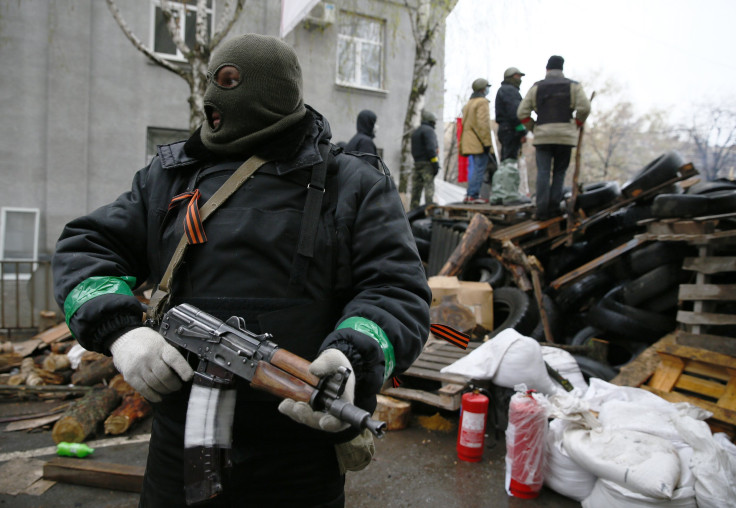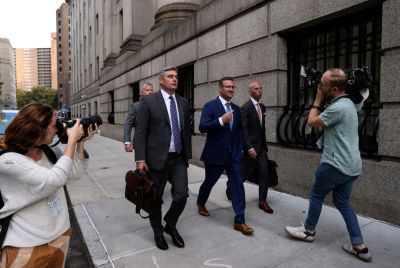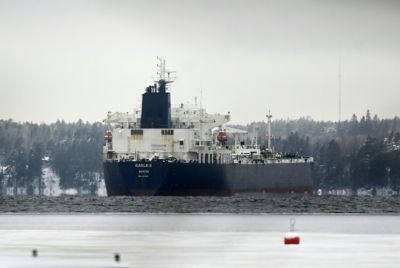Ukraine: Separatists Expand Control In East As Kiev Pleads For UN Aid

As throngs of pro-Russian supporters in eastern Ukraine continue to seize control of government buildings, Kiev has failed to follow through on threats of a military response, instead appealing to the United Nations for help.
On Sunday, the Ukrainian government in Kiev demanded that pro-Russian militants lay down their arms and vacate government buildings in the east, but the separatists ignored the Monday morning deadline and refused to do so. The major demand of the separatists is a Crimea-style referendum that would at least give them further autonomy, as a likely prelude to joining Russia.
Kiev’s impotence has angered anti-Russian nationalists in the western part of the country. Protesters gathered outside the Verkhovna Rada, the national parliament, in Kiev to demand the interim government follow through with their intervention in the eastern part of the country and that Interior Minister Arsen Avakov resign.
Earlier Monday, interim President Oleksandr Turchynov spoke with U.N. Secretary-General Ban Ki-moon, requesting U.N. peacekeeping troops for a joint “anti-terrorism operation.” Such a deployment would require the approval of the Security Council, where Russia wields a veto.
According to the English-language Kyiv Post, Turchynov also signed into law a decree from the National Security and Defense Council titled, “On urgent measures to deal with the terrorist threat and territorial integrity of Ukraine.” The contents of the decree are secret.
Turchynov also alluded to the possibility of granting more autonomy in the east, saying in a press conference, “We are ready to consider a significant expansion of regional powers of all regions and the wider reform of local self-government,” but went on to warn that instigators of violence would be punished.
Separatists in the east have occupied government and police buildings in towns and cities near the border with historically close ties to Russia. They have also set up roadblocks on major roads in and out of the region.
Meanwhile, U.S. President Barack Obama and Russian President Vladimir Putin spoke directly Monday at the request of Putin. A senior Obama administration officials called the discussion “frank and direct.” According to the Kremlin, Putin rejected claims of Russian agents' involvement in protests as "speculations based on unreliable information."
Tensions with the U.S. ratcheted up Monday when a Russian fighter jet made several low-altitude passes near the USS Donald Cook, which is currently in the Black Sea as a show of support for neighboring NATO countries. Pentagon spokesman Col. Steve Warren called the flyover “provocative and unprofessional.”
A visit to Ukraine by the head of the Central Intelligence Agency, John Brennan, had Russia politicians and media in a stir as well. Russian Foreign Minister Sergei Lavrov demanded an explanation and White House spokesman Jay Carney told reporters the visit was routine and a “means of fostering mutually beneficial security cooperation,” and later added that “To imply that U.S. officials meeting with their counterparts (in Kiev) is anything other than in the same spirit is absurd.”
The United States and European Union took some initial steps toward helping the new Ukrainian government Monday, Radio Free Europe/Radio Liberty reported. The United States announced it had signed a $1 billion loan guarantee for Ukraine, while the European Union announced a loan of nearly 1 billion euros ($1.4 billion) to Ukraine.
This comes in addition to 610 million euros of EU aid that has been approved but not yet disbursed.
© Copyright IBTimes 2024. All rights reserved.






















